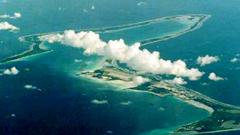The UK government's plans concerning the Chagos Islands have encountered a major setback following a last-minute injunction issued by the High Court. Justice Goose granted "interim relief" to two Chagossian women, halting negotiations that were expected to culminate in a virtual signing ceremony with Mauritian representatives. Initially set for Thursday morning, the agreement aimed to transfer the Chagos Islands back to Mauritius while allowing the UK and US to continue operations at a significant military base located in the area for 99 years.
While the UK government has yet to disclose the anticipated financial implications of this deal—predicted to be in the billions—it responded to the court's ruling with a statement asserting the importance of the agreement for national security. Mauritius's Attorney General refrained from commenting, stating that a hearing was imminent. The case will be reviewed again at 10:30 AM today.
The legal challenge brought forth by Bernadette Dugasse and Bertrice Pompe highlights deep-rooted concerns among the Chagossian community about the deals involving their homeland, which they argue have proceeded without adequate consultation. Their attorney has previously asserted that the ongoing negotiations do not reflect the voices of those most impacted.
In his order, the judge emphasized that no definitive actions could be taken regarding the transfer of the British Indian Ocean Territory until further notice. Current discussions involving Chagossian representatives and Foreign Office officials are set to address issues of sovereignty and community projects.
The Chagos Archipelago has a contentious history, having been separated from Mauritius in 1965 under circumstances that many consider unlawful. A US military base was established on Diego Garcia after the removal of thousands of residents, leading to subsequent restrictions on their return. While opinions vary within the Chagossian diaspora, many express a desire for self-determination concerning their heritage, as the negotiations continue to unfold amidst broader international scrutiny.
Local responses reflect a mix of apprehension and hope—some advocate for a return to the islands, while others seek clarity on their rights within the UK. As the situation develops, the implications of the court ruling resonate beyond legalities, impacting the lives of those with enduring ties to this historically significant territory.
While the UK government has yet to disclose the anticipated financial implications of this deal—predicted to be in the billions—it responded to the court's ruling with a statement asserting the importance of the agreement for national security. Mauritius's Attorney General refrained from commenting, stating that a hearing was imminent. The case will be reviewed again at 10:30 AM today.
The legal challenge brought forth by Bernadette Dugasse and Bertrice Pompe highlights deep-rooted concerns among the Chagossian community about the deals involving their homeland, which they argue have proceeded without adequate consultation. Their attorney has previously asserted that the ongoing negotiations do not reflect the voices of those most impacted.
In his order, the judge emphasized that no definitive actions could be taken regarding the transfer of the British Indian Ocean Territory until further notice. Current discussions involving Chagossian representatives and Foreign Office officials are set to address issues of sovereignty and community projects.
The Chagos Archipelago has a contentious history, having been separated from Mauritius in 1965 under circumstances that many consider unlawful. A US military base was established on Diego Garcia after the removal of thousands of residents, leading to subsequent restrictions on their return. While opinions vary within the Chagossian diaspora, many express a desire for self-determination concerning their heritage, as the negotiations continue to unfold amidst broader international scrutiny.
Local responses reflect a mix of apprehension and hope—some advocate for a return to the islands, while others seek clarity on their rights within the UK. As the situation develops, the implications of the court ruling resonate beyond legalities, impacting the lives of those with enduring ties to this historically significant territory.



















